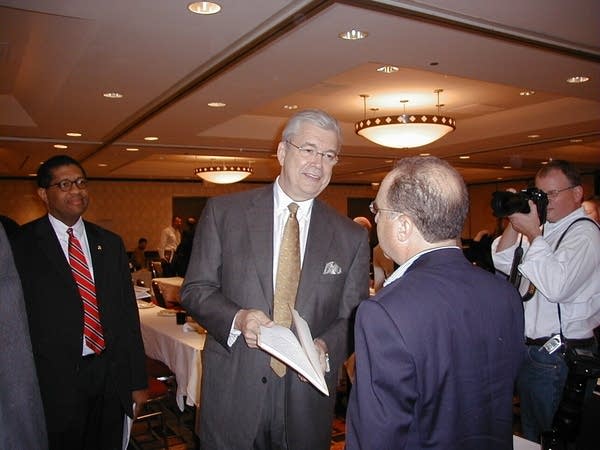UnitedHealth's troubles mount
Go Deeper.
Create an account or log in to save stories.
Like this?
Thanks for liking this story! We have added it to a list of your favorite stories.

From all the attention, it may be tempting to believe UnitedHealth's condition is critical. The company has acknowledged a "significant deficiency" in its handling of stock options and may have overstated its profits for some years. Some observers have raised doubts about the future of CEO Bill McGuire.
But no wrongdoing has yet been proven or admitted. Few analysts who follow the company see much risk of grave financial damage.
Investors, however, hate uncertainty. That, more than anything else, is what has driven the stock price down 26 percent since March, according to Thrivent Financial portfolio manager David Heupel.
There was something here that seemed more than just chance.
"We are in a vacuum," Heupel says. "We don't have any clarity on what really happened, how significant it is, what kind of a financial impact if any it will have for the company, and if there will be any changes recommended to senior management positions."
Turn Up Your Support
MPR News helps you turn down the noise and build shared understanding. Turn up your support for this public resource and keep trusted journalism accessible to all.
The spotlight hit UnitedHealth after news reports questioned how McGuire's stock options became worth $1.6 billion at one point. It is worth noting that the value of those options continues to fall, along with the company's stock price.
At the heart of the controversy is the question of "backdating." With stock options, the lower the price on the day they are granted, the bigger the payoff as the share price rises. If UnitedHealth executives could choose grant dates that they knew, in hindsight, had especially low share prices, the company might not have disclosed that properly.
So far, UnitedHealth has not revealed how it determined option grant dates. But it is among at least two dozen companies now under investigation amid questions about backdating. UnitedHealth's prominence and the huge options wealth of McGuire have made it the marquee case.
Thrivent's David Heupel says with no alternate explanation on the table, he has little doubt backdating of some sort did occur. "Taking the information we have at its face value, it certainly draws you to that conclusion: that there was something here that seemed more than just chance relative to the timing of some of the options that were granted," Heupel says.
UnitedHealth currently has internal and independent reviews of its policies underway. The company has said it believes officials acted properly. UnitedHealth did not provide anyone to comment for this story.
As a possible signal of announcements to come, UnitedHealth said earlier this month it might have to restate its earnings for the last three years, possibly trimming $286 million from its net income.
Steve Zaharuk of Moody's Investors Service says while that's a lot of money, isn't of much concern for UnitedHealth shareholders.
"We find that to be a very small number compared to UnitedHealth's total capital structure and finances," Zaharuk says. "In any given year they make close to $3 billion a year, so a $286 million hit doesn't hit them very hard."
However, Zaharuk says trimming earnings may be only the beginning. This month Moody's lowered its outlook for UnitedHealth from "stable" to "negative" -- a reflection, Zaharuk says, of the uncertainty around the backdating issue.
If the Securities and Exchange Commission finds wrong-doing, there could be fines; the IRS could assess penalties and demand back-taxes; U.S. Attorneys in New York and California could be exploring criminal charges. All have requested documents from UnitedHealth in recent weeks.
Zaharuk does not see any of these outcomes crippling UnitedHealth's business. And he is not willing to label any of these outcomes likely -- only possible.
But Zaharuk says it is likely the controversy will complicate UnitedHealth's future negotiations with customers and doctors. "You can see where doctors, as they go the negotiating table, could say, 'You want to negotiate a lower rate for this type of service, and yet you're paying your CEO this much money?'"
And Zaharuk says there is no upper bound on the damages UnitedHealth could face from the dozen or so shareholder lawsuits already filed, some of which seek class-action status. Negative findings by the SEC, IRS, or the company's own committees could have a second life as evidence in court.
UnitedHealth has faces a barrage of lawsuits, many of which make allegations similar to those New York attorney Gerry Silk is leveling. Silk is the lead counsel for suits brought by a number of large pension funds. "For McGuire and (UnitedHealth President Stephen) Hemsley we're talking about $2 billion-plus worth of options that are alleged to have been backdated," Silk says. "If that's the case, our position quite simply is that was wrongfully obtained property, those were not validly issued securities by the company. And as shareholders of the company and looking out for the company, we want that rescinded."
Despite the potential for rough times ahead, no one is predicting the demise of UnitedHealth. Unlike recent corporate scandals such as Enron or WorldCom, the backdating controversy does not raise doubts about the health of UnitedHealth's underlying business.
Shortly after Moody's issued its negative outlook for the company, another major name in investor research, Standard & Poor's, announced it was sticking with its previous, positive assessment. While acknowledging multiple risks and the potential for, "reputational damage," S&P said it does not expect the outcome of the controversy will be material to UnitedHealth's future.




